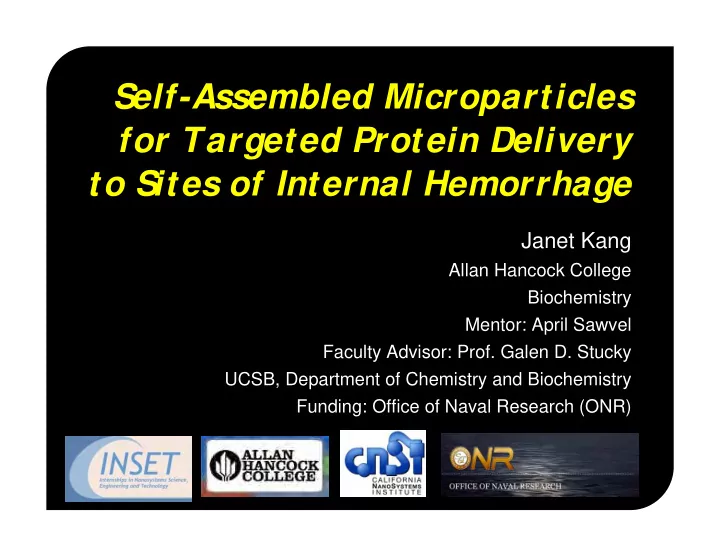

Self-Assembled Microparticles for Targeted Protein Delivery to Sites of Internal Hemorrhage Janet Kang Allan Hancock College Biochemistry Mentor: April Sawvel Faculty Advisor: Prof. Galen D. Stucky UCSB, Department of Chemistry and Biochemistry Funding: Office of Naval Research (ONR)
A New Approach to Treating Internal Hemorrhage
Research Goals Coacervates of PLE + Pentalysine astro.wisc.edu
Coacervate Synthesis 10 mins S elf-assembly 100 µm Poly-L-glutamate Pentalysine Coacervates Assembly Conditions: • pH • Ionic strength • Polyelectrolyte concentrations http:/ / pubchem.ncbi.nlm.nih.gov
CCD Optical camera Microscope DIC Camera/ eyepiece Analyzer switch Advantages DIC • Qualitative and quantitative polarizer observations (size, quantity, shape, etc) • Visually identify the type of Wollastone substance in solution prism DIC Disadvantages • Time-consuming • Wrong adj ustments miss coacervate formation
Coacervates Optical Microscopy Images PLE (2.0 mg/ mL)+Pentalysine PLE (2.0 mg/ mL)+Pentalysine PLE (2.0 mg/ mL)+Pentalysine (3.4 mg/ mL) (1.7 mg/ mL) (0.7 mg/ mL) 50 µm 50 µm 50 µm PLE (2.0 mg/ mL)+Pentalysine PLE (2.0 mg/ mL)+Pentalysine PLE (2.0 mg/ mL)+Pentalysine (0.6 mg/ mL) (0.4 mg/ mL) (0.3 mg/ mL) 50 µm 50 µm 50 µm 2.0 mg/ mL PLE with various pentalysine concentrations � No coacervate formation at pentalysine concentrations below 0.3 mg/ mL
Coacervate Optical Microscopy Images (cont.) PLE (5.0 mg/ mL)+Pentalysine PLE (5.0 mg/ mL)+Pentalysine (1.7 mg/ mL) (0.7 mg/ mL) 50 µm 50 µm 20x magnification PLE (5.0 mg/ mL)+Pentalysine PLE (5.0 mg/ mL)+Pentalysine (1.7 mg/ mL) (0.7 mg/ mL) 50 µm 50 µm 50x magnification 5.0 mg/ mL PLE with two different pentalysine concentrations
Summary and Future Plans � S ize of coacervates increases and quantity slightly decreases with increasing pentalysine concentration � Immediate plans: � Test more pentalysine concentrations with 5 mg/ mL PLE to verify conclusion � Analyze images with ImageJ software for quantitative results � Explore effects of pH and ionic strength � Cross-link coacervates under different conditions to determine how solution conditions influence microparticle properties � Long-term plans: � Encapsulate thrombin in microparticle carriers and quantify thrombin-loading capacity � Develop a thrombin release mechanism that is specific to the site of inj ury � Develop a particle anchor that is specific to the site of inj ury
Acknowledgements April Sawvel Prof. Galen D. Stucky David Garcia (RISE Intern) The Stucky Group INSET & CNSI ONR (Office of Naval Research)
Any Questions? Thank You!
Recommend
More recommend